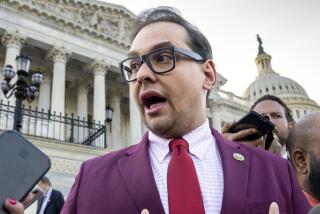Lincoln S&L; Bondholders Urge Cranston’s Ouster : Thrifts: The Senate Ethics Committee should not stop at a slap on the wrist, they say, now that the panel has found him culpable in the Irvine-based institution’s collapse.
Some of the bondholders who lost more than $200 million in the collapse of Lincoln Savings & Loan want the Senate Ethics Committee to recommend the ouster of Sen. Alan Cranston for his role in the Lincoln scandal.
Some also reacted angrily to the committee’s decision Wednesday to close the case against the other four of the so-called Keating Five and let them off with what the bondholders called a slap on the wrist.
Even onetime admirers of the California Democrat said Cranston’s support for former Lincoln owner Charles H. Keating Jr. was bought with more than $900,000 that the senator received in Keating-affiliated contributions for his campaigns and political causes.
“On an emotional and personal level, I don’t think anything short of severe civil and possible criminal charges should be leveled against them,” said Donald Mikami, a Fountain Valley dentist and bondholder.
The reaction came after the Ethics Committee ended its 17-month investigation Wednesday. It found that Cranston was the most culpable of the senators who came to Keating’s aid.
“There is credible evidence that provides substantial cause for the committee to conclude . . . that Sen. Cranston engaged in an impermissible pattern of conduct, in which fund raising and official activities were substantially linked,” the committee said.
The panel gave him a chance to respond before making a recommendation to the full Senate about any institutional action.
The committee found that Sens. Dennis DeConcini (D-Ariz.) and Donald Riegle (D-Mich.) showed “insensitivity and poor judgment” and that Sens. John Glenn (D-Ohio) and John McCain (R-Ariz.) showed “poor judgment” in their relationship with Keating. But the panel did not recommend additional action against those senators.
Most bondholders are retired investors such as Leah Kane of Laguna Hills, and many lost their life savings.
“They must be made to resign and to pay back some of this money out of their own pockets, or at least their pensions should be taken away,” Kane said. “Something should be taken away from them, just as it was taken away from us.”
In April, 1987, at Keating’s request, the five senators had intervened in a yearlong dispute between Keating and federal thrift regulators over the federal audit of Irvine-based Lincoln.
Meanwhile, Lincoln’s parent firm, American Continental Corp. in Phoenix, had recently begun issuing bonds through Lincoln’s 29 Southern California branches. The securities, which even Keating later acknowledged were junk bonds, were sold mainly to elderly depositors. Many of them thought the bonds were insured or as safe as their deposits. But the bonds were not.
Bondholders allege that the senators played a major role in allowing the bond sales to continue by delaying action against Lincoln--even though regulators said they were not intimidated by the meetings.
“I was a supporter of Cranston’s,” said Shirley Lampel, a Tustin bondholder. “Now, there’s no question in my mind that he has no right to continue as a senator. The job he was doing has nothing to do with his real job of representing the people of California.”
Jack C. Lower of San Jacinto in Riverside County described himself as a former admirer of Cranston who found it difficult to believe at first that the senator was involved in the Lincoln scandal. Now he wants Cranston thrown out of the Senate but said the “guiltiest” people in the scandal are the state and federal regulators who allowed the bond sales.
Oceanside retiree Charles Sullivan Sr., 78, said he believes that Cranston “disgraces the Senate” but will leave with a hefty pension intact. That would leave the senator much better off than Sullivan and his wife.
“We’ve lost our life savings due to him,” he said.
More to Read
Get the L.A. Times Politics newsletter
Deeply reported insights into legislation, politics and policy from Sacramento, Washington and beyond. In your inbox three times per week.
You may occasionally receive promotional content from the Los Angeles Times.










